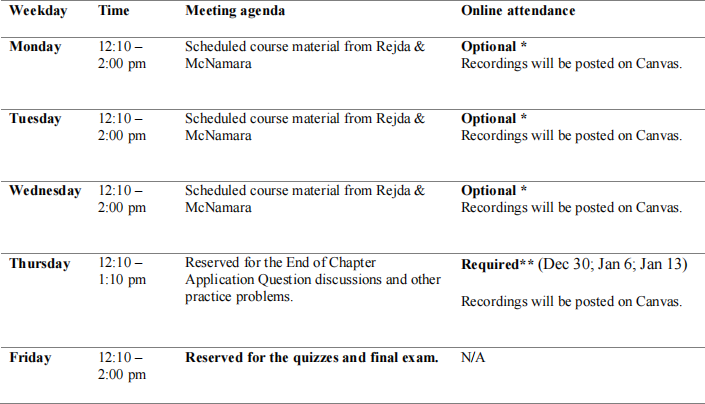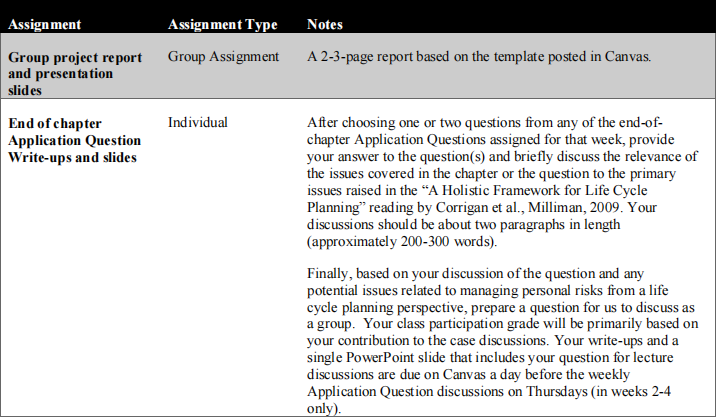FIN 361 PERSONAL RISK MANAGEMENT AND INSURANCE
Hello, dear friend, you can consult us at any time if you have any questions, add WeChat: daixieit
Department of Finance
FIN 361 PERSONAL RISK MANAGEMENT AND INSURANCE
Winter Session 2022
Required materials:
• Required text:
Principles of Risk Management andInsurance, 14th Edition, Rejda, McNamara, Rabel, Pearson.
Note: All students are automatically enrolled in the Direct Access program, which provides an e-book version of the course textbooks. Please refer to the announcement posted on Canvas for additional information.
• The class web page in Canvas
• Recommended Calculator: Texas Instruments BAII Plus.
Course description and learning objectives:
The primary objective of this course is to introduce you to the risk management techniques to assess and manage risks faced by individuals and families. To this end, the course emphasizes risk concepts and the use of insurance when dealing with life cycle financial risks, legal concepts, insurance operations and contracts, property and liability risks. The course also covers selected topics on risk measurement and metrics, insurance markets and regulation, employment-based and individual longevity risk, and individual health risk management. After the course, students should be familiar with the consideration and selection of various personal risk management strategies and have the ability to apply the knowledge learned in class to understand current events that are built through class discussions and course assignments. The issues listed on the course schedule provide an outline of the course learning objectives.
Of necessity, the discussion of these issues involves theoretical concepts. Effort is made, however, to spend a large percentage of time discussing examples and the practical application of these concepts through example problems. Also feel free to make full use of instructor office hours to aid in understanding the material. Because ofthe breadth ofthe material covered, we will be selective in the topics in which we delve deep. We will be introducing a lot of topics, terms and concepts, and it is imperative that you stay up to date with the assigned reading material because we will dedicate a large portion of the class time on in-class exercises and example problems that will build on the concepts and issues introduced in your reading assignments.
Prerequisite Course Work:
FIN 301. The College of Business has implemented a policy of strict enforcement of prerequisites for all business classes. Students who lack prerequisite course work must drop the class. Students who feel that the information from a computer check identifying them as lacking prerequisite course work is inaccurate should see Advising in 1200 Gerdin.
Online Lectures:
Due to the compressed nature of our schedule, there will be frequent uploads of lecture videos and other course material on the course website. Unless it is a university holiday, course lectures will be delivered through WebEx according to the outlined schedule below. Note that I’ll also be uploading additional videos as needed to supplement the lecture recordings. If you have a conflict with any of the scheduled case discussions or quiz periods, please let your instructor know as soon as possible at the beginning of the semester.

(*) Although attendance is not required on these days, students are encouraged to join the live lecture presentations via WebEx and ask questions to the course instructor.
(**) Since students are expected to participate in the course to discuss their write-up submissions on Thursdays, please notify your instructor at the beginning of the semester for alternative arrangements if you have a conflict during these lecture periods.
Evaluation:
This course includes two online quizzes and a comprehensive final exam with more weight on the material covered in the second half of the course. All exams will be administered by assigning short calculation and essay questions in Excel. The exams will mainly include questions related to the example problems solved during lectures and may repeat questions from previous quizzes to reinforce your understanding of the material. Each quiz will have a balance of conceptual questions and numerical calculations. In the case of a valid and foreseen reason causing an absence from an exam, the student will be responsible for notifying the professor prior to the exam. In the case of a valid and unforeseen reason causing an absence from an exam (e.g., documented illness), the student will be responsible for notifying the professor as soon as possible after the event causing the absence. There will be no make-up exams for the quizzes unless you have a documented excuse.
Group Project andReport
This course involves one team-based assignment that includes a written report and a short PowerPoint presentation summarizing your findings. The project will consist of a retirement planning simulation problem to be solved with Oracle’s Crystal Ball software.
The report assignment involves a 2-3-page memorandum that summarizes your team’s analysis based on the contribution and investment yield assumptions given in the model. The page limit applies to text only; you may include as many tables and figures as you wish. Your reports will be graded based on the coherence and consistency of your findings based on the central issues raised in the “A Holistic Framework for Life Cycle Planning” reading by Corrigan et al., Milliman, 2009, and the soundness of your supporting evidence based on the simulation results.
Additional guidance on how to access the Crystal Ball software and report format will be provided during the first week ofthe semester. The table below provides a summary ofthe course assignments.

Each group member must make a substantial contribution to the group assignment. Group members will be asked to evaluate each member’s contribution to the group, including their own, by the end of the semester. Even though all group members will receive a single grade, poor peer evaluations indicating a lack of contribution to group work could lead to a grade penalty based on my discretion. Once groups are formed, they cannot be changed. If you anticipate that, for any reason, you will not be able to contribute to your group’s work over the semester or would prefer to work individually on the assignments, you must notify me for alternative arrangements by the end ofthe first week ofthe course.

Academic misconduct:
Academic misconduct is a violation of the behavior expected of a student in an academic setting as well as a student conduct violation. A student found responsible for academic misconduct is subject to the appropriate academic penalty, determined by the instructor of the course, as well as sanctions under the university Student Disciplinary Regulations. Depending on the act, a student could receive an F grade on the test/assignment, F grade for the course, and could face suspension from the University. See the Student Disciplinary Regulations at http://www.policy.iastate.edu/policy/SDRfor more details and a full explanation of the policy on Academic and Research Misconduct by students.
Accessibility Statement:
Iowa State University is committed to assuring that all educational activities are free from discrimination and harassment based on disability status. Students requesting accommodations for a documented disability are required to meet with staff in Student Accessibility Services (SAS) to establish eligibility and learn about related processes. Eligible students will be provided with a Notification Letter for each course and reasonable accommodations will be arranged after timely delivery of the Notification Letter to the instructor. Students are encouraged to deliver Notification Letters as early in the semester as possible. SAS, a unit in the Dean of Students Office, is located in room 1076, Student Services Building or online at www.sas.dso.iastate.edu. Contact SAS by email at[email protected]or by phone at 515-294-7220 for additional information.
Statement on Free Expression:
Iowa State University supports and upholds the First Amendment protection of freedom of speechfreedom of speech and the principle of academic freedom in order to foster a learning environment where open inquiry and the vigorous debate of a diversity of ideas are encouraged. Students will not be penalized for the content or viewpoints of their speech as long as student expression in a class context is germane to the subject matter ofthe class and conveyed in an appropriate manner.
The Writing and Media Center (WMC):
The Writing and Media Center (WMC) helps students become effective, confident communicators. The center supports students during all stages of the writing process, from brainstorming to revising, as well as with oral, visual, and electronic communication. While they can help students identify patterns and trends in their spelling and grammar, they do not provide editing services. The center offers one-on-one and group consultations online.
To register and schedule an appointment, seehttps://iastate.mywconline.com/.
For more information, visit https://www.wmc.dso.iastate.edu.
Discrimination and Harassment:
Iowa State University strives to maintain our campus as a place of work and study for faculty, staff, and students that is free of all forms of prohibited discrimination and harassment based upon race, ethnicity, sex (including sexual assault), pregnancy, color, religion, national origin, physical or mental disability, age, marital status, sexual orientation, gender identity, genetic information, or status as a U.S. veteran. Any student who has concerns about such behavior should contact his/her instructor,Student Assistanceat 515- 294-1020 or email[email protected], or theOffice of Equal Opportunity and Complianceat
515-294-7612.
Religious Accommodations:
If an academic or work requirement conflicts with your religious practices and/or observances, you may request reasonable accommodations. Your request must be in writing, and your instructor or supervisor will review the request. You or your instructor may also seek assistance from the Dean of Students Office or the Office ofEqual Opportunity and Compliance.
Related to ISU’s Principles of Community:
Students are responsible for living the tenets established in ISU’s Principles of Community: Respect, Purpose, Cooperation, Richness ofDiversity, Freedom from discrimination, and the Honest and respectful expression of ideas. Visit ISU’s Principles of Community website (http://www.diversity.iastate.edu/principles- ofcommunity)
Regarding name, gender identity and/or gender expression:
Class rosters are provided to the instructor with the student's legal name. I will gladly honor your request to address you by an alternate name or gender pronoun. Please advise me of this preference early in the semester so that I may make appropriate changes to my records.
Promoting student health and wellness:
Iowa State University is committed to proactively facilitating the well-being of all students. We welcome and encourage students to contact the following on-campus services for assistance regarding their physical, intellectual, occupational, spiritual, environmental, financial, social, and/or emotional needs:
• Student Wellness call (515) 294- 1099 or via website (http://studentwellness.iastate.edu);
• Thielen Student Health Center call (515) 294-5801 (24/7 Medical Advice) or via website (http://www.cyclonehealth.org);
• Student Counseling Services call (515) 294-5056 or via website (https://counseling.iastate.edu);
• Recreation Services call (515) 294-4980 or via website (http://recservices.iastate.edu).
• Students dealing with heightened feelings of sadness or hopelessness, thoughts of harm or suicide, or increased anxiety may contact the ISU Crisis Text Line (Text ISU to 741-741) or contact the ISU Police Department (515) 294-4428.
About mutual respect and professionalism:
You are expected to treat your instructor and all other participants in the course with courtesy and respect. Your comments to others should be factual, constructive, and free from harassing statements. You are encouraged to disagree with other students, but such disagreements need to be based upon facts and documentation (rather than prejudices and personalities). It is the instructor’s goal to promote an atmosphere of mutual respect in the classroom. Please contact the instructor if you have suggestions for improving the classroom environment. It is preferable if students discuss issues directly with the instructor, however, students may also leave a note in the instructor’s mailbox.
2021-12-27